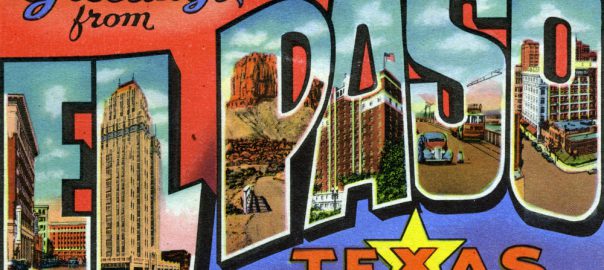Now, flouting all advice, we had El Paso as a day’s destination. We planned to reach its eastern fringe, retire to some Shady Rest, then roll up the final miles the following morning.
First, though, there was Hobbs. The Other Road angles through New Mexico from one Texas Panhandle to another and Hobbs is the first town in, first sign of any habitation at all in fact, save for an oil-pumping donkey at the state line. We were now on Mountain Time.
Hobbs is an attractive, efficient, industrious, self-confident little city and while The Other Road sort of runs around it, we didn’t. While Walmart caught us up on photo processing, we bought several souvenirs and gifts at the Grafter’s Corner, which actually covers several acres.
The Hobbs Donut Shop sold us the next two days’ breakfasts. In all deference to the Amish, these were the blue ribbon doughnuts of Route 62. And for today, the clerk, in a charming Spanish lilt, sent us on to Chili Peppers Restaurant on Mariad Boulevard.
Polly little relishes spicy food at any hour and Chili Peppers tended her tastes with gentility. Doug added eggs quesadillas, sort of a huge Mexican-style McMuffin, to his roster of regional repasts — the quail, the chicken-fried steak, the cat nip. Still no after-effects.
There were huge gateways silhouetting the names of dozens of ranchers along 62’s next 62 miles over to Carlsbad, about a third the size of Hobbs. It had a well-maintained movie theater (The Cavern), and a dress shop with Polly’s full name (Pauline) in enamel tiles. In making a good impression, Land of Enchantment cities were two-for-two.
But from here westward, not even the most optimistic map hinted at any habitation save for White’s City, a horrid souvenir storefront fashioned to sift the last dollar from the pockets of overnighters at Carlsbad Caverns.
After more ranch gates, 62 became upwardly mobile through the Guadelupes. It was magnificent yet manageable and eminently photogenic, worth an entire roll at one turn in the road, which was now called The Texas Mountain Trail.
Then it leveled onto expanses of salt flats, past adobe motor courts, long abandoned, then through a little oasis settlement called Cornudas.
Suddenly The Other Road was full of cattle. Men astride horses were closing a gate on the north side of the road, opening, then closing one on the south, a genuine “Lonesome Dove” cattle drive. We’d missed a lot of it and hadn’t the brass to holler “Come back so we can take your picture,” but some of its remains were in the road; others in the thin, dry air.
Forty-one miles later came the nightmare of El Paso, all construction and no place to grow. There’d been no roadside inns since Cornudas and to find one we fought our way along an expressway. The pace was frenzied through smoke and dust, the furnace of the sun red and low. It looked like the evacuation of hell.
In what was sold to us as the largest room in a Residence Inn, a dog would have had to wag vertically lest it knock pictures from the wall. Doug walked a quarter-mile over a sand dune to bring back bagged ice from a convenience store and then a salad from a most accommodating Tex-Mex restaurant. They were right, we didn’t want to come to El Paso.
